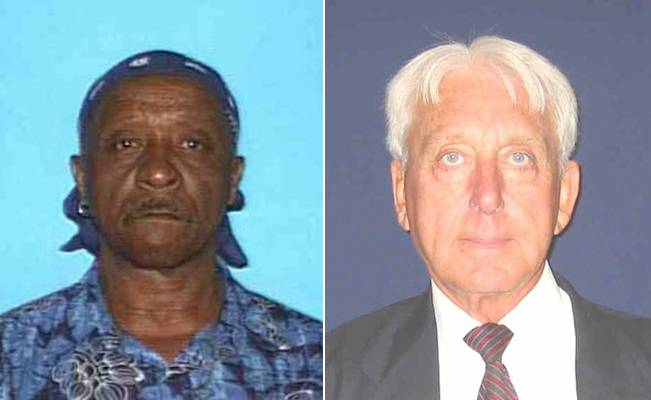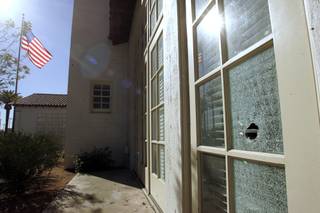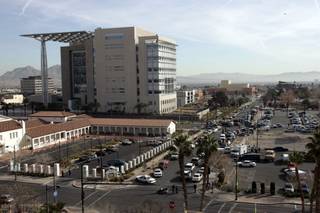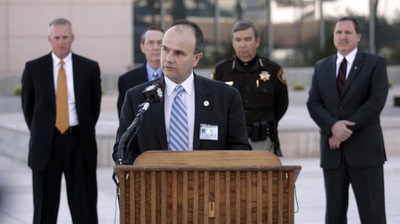
Johnny Lee Wicks and Stanley Cooper
Published Tuesday, Jan. 5, 2010 | 9:58 a.m.
Updated Tuesday, Jan. 5, 2010 | 5:58 p.m.
Courthouse Shooting News Conference
Officials outline gunman, Johnny Lee Wicks' criminal history at news conference.
Related Document
Neighbors of Gunman React
Neighbors of Johnny Lee Wicks, 66, are shocked after the lone gunman opened fire in the Lloyd D. George Federal Courthouse Monday morning. Wicks lived at the Sunrise Senior Village complex at 571 N. 30th St., where a fire broke out about three hours before the shooting.
It was back to business at the Lloyd D. George Federal Courthouse on Tuesday, a day after a disgruntled man and a court security officer died in a hail of gunfire.
The man responsible for the shooting was Johnny Lee Wicks, 66, who officials have said was angry over a legal case involving his Social Security benefits.
But Wicks' “heinous act” at the federal courthouse wasn’t his first brush with the law, said FBI Special Agent in Charge Kevin Favreau, of the Las Vegas field office, citing a lengthy criminal record that reaches back several decades.
In 1974, he was convicted in the murder of his brother, Leo Wicks, in Memphis, Tenn., and sentenced in 1976 to 12-15 years for second-degree murder and paroled in 1981, said Dorinda Carter, spokeswoman for the Tennessee Department of Corrections. He picked up various drug charges in that city over the next 10 years.
He was accused of assault to commit rape in Sacramento in 1989, Favreau said. He served jail time after pleading no contest to domestic battery in Sacramento in 1995, court records there show.
Wicks also feuded with managers of a downtown apartment building for seniors and people with disabilities in Fresno, where his handwritten protest of his eviction and a small claims court filing in 1998 included an allegation that he was ousted "Because I am Black."
“Our investigation strongly indicates that Wicks acted alone and that his motive was an overwhelming anger toward the United States government,” Favreau said at a news conference Tuesday in front of the courthouse, which showed visible signs of yesterday’s gun battle. A wooden panel covered a shot-out front window.
Wicks' victims, 72-year-old Stanley Cooper and an unidentified deputy marshal, were taken to University Medical Center, where Cooper later died. The deputy marshal has since been released from the hospital.
As for why Wicks chose Monday to stage his attack, the answer, so far, remains a mystery. Wicks’ case had been dismissed in September. Investigators have found no specific motive as to why Wicks staged his attack Monday.
What investigators do know is that at 5:46 a.m. Monday, Wicks’ apartment at the Sunrise Senior Village complex at 571 N. 30th St., near North Mohave and East Bonanza roads, caught fire. Wicks left the residence and apparently walked the three miles to the courthouse with a Mossberg 12-gauge shotgun hidden in his jacket.
Las Vegas Fire & Rescue spokesman Tim Szymanski said in a statement that it couldn’t be determined if the fire was intentionally set or if it was caused by careless smoking. The fire damage was confined to a small closet in the bedroom but the odor of smoke wafted throughout the building, he said.
When Wicks arrived at the courthouse, he opened fire as soon as he walked into the building, said Metro Police Lt. Lew Roberts. Three deputy U.S. marshals and four court security officers returned fire and chased him from the building.
Cooper was able to fire one shot and the deputy marshal returned fire, Roberts said. In total, the officers fired 81 rounds at him. Wicks was wounded by a bullet to the stomach and suffered a fatal shot to the head in the exchange.
He died outside the historic Fifth Street School, which is across the street from the courthouse. An autopsy hasn’t yet been completed, Roberts said. The FBI has interviewed dozens of witnesses.
The deputy marshal, identified as a 48-year-old man with 24 years of service, has since been released from the hospital and is recovering, said Gary Orton, U.S. marshal for the District of Nevada. His identity will be released by the marshal’s service once he has a chance to recover, he said.
Roberts said Wicks was armed with the capacity to fire more than five rounds “but due to the quick response by the court personnel, he was not able to do that.”
“When the officers were pursuing (Wicks), he actually turned and faced the officers and fired his last two additional rounds at the officers at the Fifth Street School,” Roberts said. He wouldn’t be specific as to how many bullets Wicks had on him but said it was more than the five he fired.
The shotgun was the only weapon he was armed with, Roberts said.
Evidence of shotgun blasts and return fire was apparent at the buildings near the courthouse, but the area was calm on Tuesday.
Across the street in front of the Fifth Street School, gardeners pruned plants and people sat in the courtyard.
Eight windows were broken on the east side of the school. A tree was shredded with bullets. Blood dotted the leaves of a plant. A paint outline marked the spot where Wicks was fatally wounded.
At the federal courthouse, Southern Nevadans reported for jury duty, for work or to appear in court, as they would have on any other weekday.
Terri Jamison, 56, of Las Vegas, is a data analyst for the civil division at the federal courthouse. Even though she watched the shooting unfold from her fourth-floor office, she said she wasn’t nervous to come in to work today.
“We get checked every time we go in, and we know everyone else is, too,” she said. “That’s why we feel pretty secure.”
Jamison said she ran to her window Monday morning after hearing gunshots outside. She saw police officers run after the suspect and subdue him across the street.
Jamison said she knows the federal courthouse is a place where people often feel tense or disgruntled.
“We’ve had a lot of really volatile cases,” she said.
Elaine Martinez, 64, of Henderson, was reporting for a court summons Tuesday. She said she had been a little apprehensive to come to the courthouse.
“I was just very grateful I wasn’t asked to come on Monday,” she said. “I was kind of hoping they would cancel it [today].”
Lily Buckley, 55, of Pahrump, was reporting for jury duty at the courthouse. It was Buckley’s first day of jury duty.
“I’m not concerned,” she said. “I feel bad for the guard … I’m glad I wasn’t here yesterday.”
Orton wouldn’t specify whether security at the courthouse had been increased in the wake of Monday’s attack but said staff could be rearranged “as necessary to meet the special needs of the courthouse.”
Officials from the U.S. Immigration and Customs Enforcement were patrolling outside the building Tuesday morning. The valley’s uniformed law enforcement officers wore black bands across their badges in honor of Cooper.
Sheriff Doug Gillespie said before becoming a court security officer, Cooper had been with Metro Police for 26 years.
“He retired as a sergeant and then moved on to protecting our courts,” Gillespie said. “His death yesterday was truly a tragedy.”
The U.S. Attorney has offices on the fourth and fifth floors of the courthouse. U.S. Attorney for Nevada Daniel Bogden said Cooper would be sadly missed.
“(Cooper was) a dedicated professional. A man who when you walked up to him and spoke with him, he was one of those wonderful people who could touch your life. It’s a shame things had to end for him this way,” he said.
He offered condolences to Cooper’s family, which includes three sons, and said he was praying for the deputy marshal to have a speedy recovery.
Orton said it was the professionalism of Cooper and his fellow officers that kept Monday’s tragedy from being a worse situation.
“While the death of Officer Cooper, a lifelong law enforcement officer here in the valley, is tragic and senseless … I am convinced that if not for the professionalism and sheer determination of our officers and deputy marshals to keep everyone in the courthouse free from harm and danger, this tragedy could have been much worse.”
Gillespie commended the manner in which law enforcement officials from Metro, the FBI, the U.S. Marshals Service and other agencies, including the North Las Vegas Police Department, responded to the attack.
“I want to point out that security officers and law enforcement officers did their jobs well -- they kept everyone inside and outside that courthouse safe and the gunman was not able to access the courtrooms or the judges,” Gillespie said. “I want to reassure the public that the law enforcement community you trust with your safety responded as I expected them to.
Funeral arrangements for Cooper haven’t been announced.
Sun reporter Erin Dostal and The Associated Press contributed to this report.




Join the Discussion:
Check this out for a full explanation of our conversion to the LiveFyre commenting system and instructions on how to sign up for an account.
Full comments policy